Posts by Christopher Lochhead
342 One Woman’s October 7th Bravery At The Nova Festival Massacre In Israel with Natalie Sanandaji
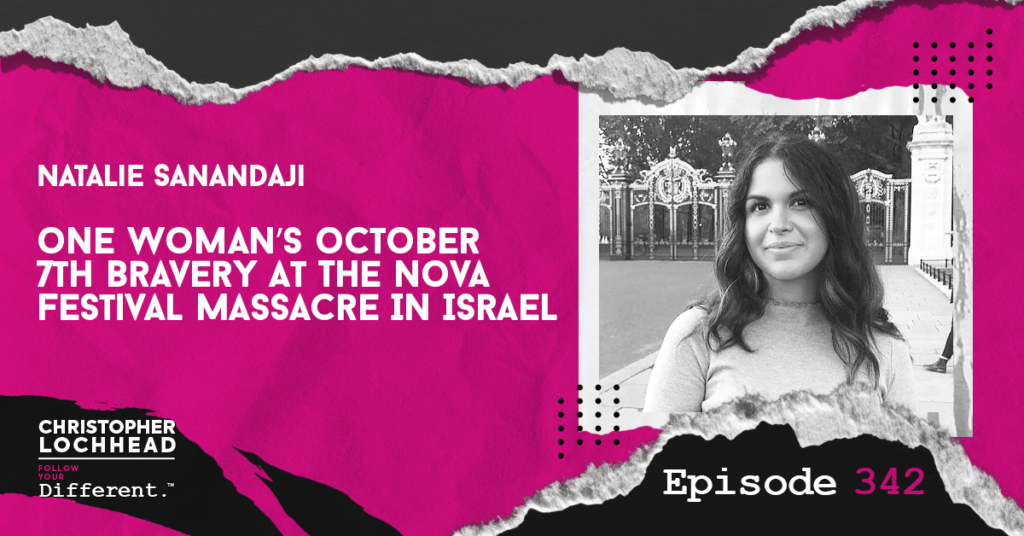
Podcast: Play in new window | Download (Duration: 1:17:11 — 53.0MB) | Embed
Subscribe: Apple Podcasts | Spotify | Pandora | RSS | More
Today marks the 100th day from the terrorist attack done by Hamas that took the lives of many civilians in Gaza. On this episode, our guest is an extraordinary woman named Natalie Sanandaji, who shares her experience as it happened on what could be described as the worse day for Jews since World War II.
What you’re about to hear is a real, unedited, unfettered, unfiltered conversation about an extraordinary event that happened on October 7, and has been impacting the rest of the world since.
You’re listening to Christopher Lochhead: Follow Your Different. We are the real dialogue podcast for people with a different mind. So get your mind in a different place, and hey ho, let’s go.
Natalie Sanandaji on the Day of the Attack
The conversation starts off with Natalie painting a scene on how she found herself in the middle of the October 7th terrorist attack, where Hamas militants killed civilians and held the population hostage.
For context, Natalie is an American-Persian Jew, who visits her relatives frequently, especially during holidays and family celebrations. As such, her visit back in October was for vacation, so she could be with them in the upcoming holiday season.
That said, she had heard that there was an upcoming Nova Music Festival nearby, wherein they can camp out and enjoy music, which often lasted for a few days. The immediate comparison is that it was like Woodstock, as the themes of peace with music was similar.
The irony of the event and what happened afterwards did not escape Natalie.
Natalie Sanandaji on the Start of the Attack
After the first night of the festival was over, Natalie and her friends decided to go back to their campsite and take a nap until the morning set of the festival. But instead of waking up to the sound of music, they were woken up by the sound of rockets.
“One of our friends from our campsite was on the dance floor when the rock first rockets were intercepted overhead, and she knew that we were still at the campsite sleeping; we hadn’t woken up yet. So she came back to the campsite to wake us up, because she wants to make sure that we were alert to what was happening. She came in she woke us up and she was all smile-y. And she was like, “Hey guys, good morning. I just want to wanted you to know a few rockets were intercepted overhead. But it’s fine.” “
– Natalie Sanandaji
Normally, the Iron Dome would’ve intercepted the few rockets and everything would be back to what they were, with their biggest fear being getting hit by falling debris. But there was something to the amount and frequency of the rockets that made Natalie’s friend think that this was different.
Escalation
After hearing more than a dozen rocket explosions, Natalie and her friends decided to pack up and just go home. Party’s over. Though there were people who were starting to panic as they were going to their cars, the whole vibe of it was more annoyance than fear – annoyed that the festival was cut short because of what was happening.
Natalie and here friends themselves were not in a hurry. She even found time to go to the bathroom to freshen up while her friends waited by the car. Only later did Natalie find out that that decision could’ve been a fatal mistake on her part.
“I went to the bathrooms and then I went back to the car, and not until about two weeks later did I realize how much I was putting my life in danger by going to those bathrooms. Because about two weeks later was when a video surfaced of the Hamas terrorists coming to those exact bathrooms where I was maybe 10-15 minutes later, and just shooting at every bathroom stall trying to kill anyone who was hiding inside.”
– Natalie Sanandaji
As they drove out of the venue, the festival security was herding the leaving people into the dirt roads for better traffic. Though suddenly, those same security people started telling people to go back, and later on telling them to get out of their cars so they could run and hide. Only then did people know that something was horribly wrong.
And then, the sound of gunshots started to get louder and closer.
To hear more from Natalie Sanandaji and her account on what happened on that fateful day, download and listen to this episode.
Bio
Natalie Sanandaji, 28, serves as a public affairs officer for the Combat Antisemitism Movement (CAM).
A Long Island native, Natalie worked in real estate in New York City before October 7th, when she survived the Nova music festival massacre during a visit to Israel. Her traumatic experience that day led her to transform her life and switch her professional track to Jewish advocacy and fighting antisemitism.
Links
Connect with Natalie Sanandaji!
Combat Antisemitism Movement | CAM Twitter/X
We hope you enjoyed this episode of Christopher Lochhead: Follow Your Different™! Christopher loves hearing from his listeners. Feel free to email him, connect on Facebook, Twitter, Instagram, and subscribe on iTunes!
341 How To Become A Category Pirate | Christopher Lochhead on Lenny’s Podcast with Lenny Rachitsky
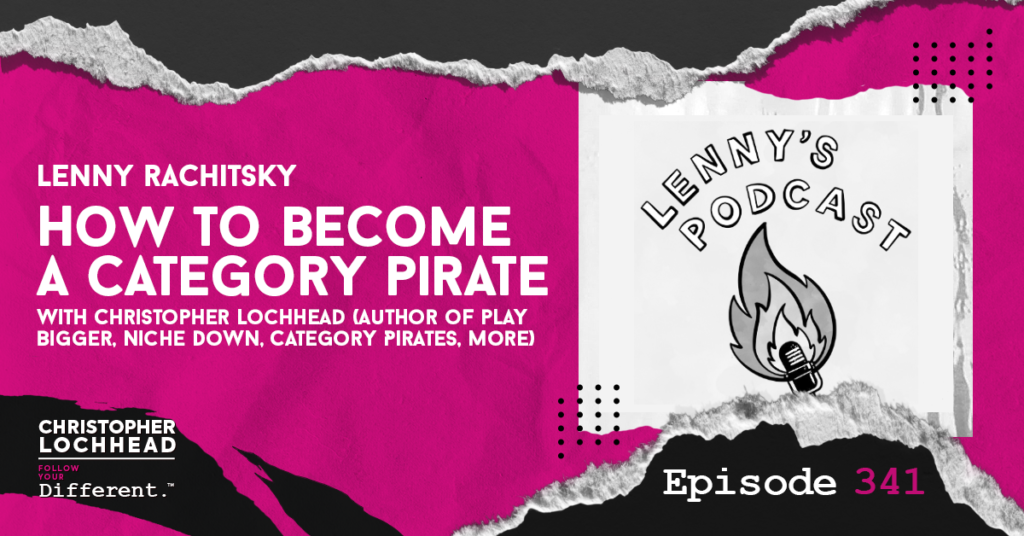
Podcast: Play in new window | Download (Duration: 1:48:49 — 74.7MB) | Embed
Subscribe: Apple Podcasts | Spotify | Pandora | RSS | More
This week on Christopher Lochhead: Follow Your Different, we’re presenting to you Christopher’s appearance on Lenny’s Podcast, hosted by Lenny Rachitsky.
Lenny Rachitsky runs the #1 Business Substack newsletter, Lenny’s Newsletter. It is legendary especially for people in tech marketing, product marketing, and startups. It’s so legendary that even Christopher pays for it. And now, he’s in it.
This is one of the more in-depth discussions Christopher has had with a very smart person about category design in a while. So settle in for a good listen and great lesson about category design.
You’re listening to Christopher Lochhead: Follow Your Different. We are the real dialogue podcast for people with a different mind. So get your mind in a different place, and hey ho, let’s go.
This episode originally aired on Lochhead on Marketing episode 187. If you want to hear more insights on marketing and category design from Christopher, feel free to check it out at Lochhead on Marketing and anywhere you listen to podcasts.
On taking the Good with the Bad
Lenny starts off the conversation by showing appreciation to Christopher’s extensive work, and jokingly adds that it was challenging to prepare for their conversation due to his numerous podcasts, books, and other content.
That said, Lenny noticed Christopher’s website displayed negative reviews prominently. When asked about it, Christopher explained his approach with humor, calling his team Category Pirates and embracing criticism. He believed it was essential for innovators not to fear criticism, citing examples of famous artists and musicians who faced initial negativity. Christopher displayed the negative feedbacks to show the reality of creative work and to remind people not to take themselves too seriously.
Lenny admired Christopher’s ability to handle criticism and expressed the desire to adopt a similar mindset.
Lenny Rachitsky on how Lenny’s Newsletter came to be
Christopher Lochhead expressed admiration for Lenny’s branding choices, appreciating the simplicity of just being called “Lenny.” He found it endearing and highlighted that Lenny’s authenticity stood out in a world where many influencers create an aura of superiority.
Lenny shared that the name “Lenny’s Newsletter” was a default suggestion from Substack, and he never intended it to be a long-term commitment. Similarly, he struggled to find a different name for his podcast, wanting to avoid a self-centered approach.
But despite having his name in the branding, Christopher noted the content wasn’t self-centered; instead, it reflected Lenny’s genuine approach, unlike influencers who focus on creating envy. They both appreciated the authenticity in Lenny’s approach.
Lenny Rachitsky and Christopher Lochhead talk Category Creation
Lenny asked Christopher about category creation, a concept Christopher has championed over competition in existing markets.
Christopher explained how most people aim to compete by offering a better product or service in an existing category. However, legendary innovators don’t follow this path. They create entirely new categories, defining unique problems and solutions. Christopher emphasized that a single company in a category usually captures two-thirds of the market value, making category creation a lucrative strategy.
He cited Gojo Industries, creators of Purell, as an example. They didn’t just invent hand sanitizer; they redefined the problem of hand cleanliness, leading to a new market category. Christopher stressed the importance of focusing on problem-solving rather than just product features, making one’s brand irreplaceable in customers’ minds. He contrasted this approach with typical marketing, where companies invite comparison, emphasizing the power of radical differentiation and being a category creator.
To hear more about Christopher’s conversation with Lenny Rachitsky on Category Creation, download and listen to this episode.
If you want to learn more about Lenny Rachitsky and his works, check out his Newsletter and Podcast at LennyRachitsky.com and LennysPodcast.com.
We hope you enjoyed this episode of Christopher Lochhead: Follow Your Different™! Christopher loves hearing from his listeners. Feel free to email him, connect on Facebook, Twitter, Instagram, and subscribe on iTunes!
340 2024: DEI, AI, The Cloud & Beyond with Bob Evans & John Siefert of Acceleration Economy
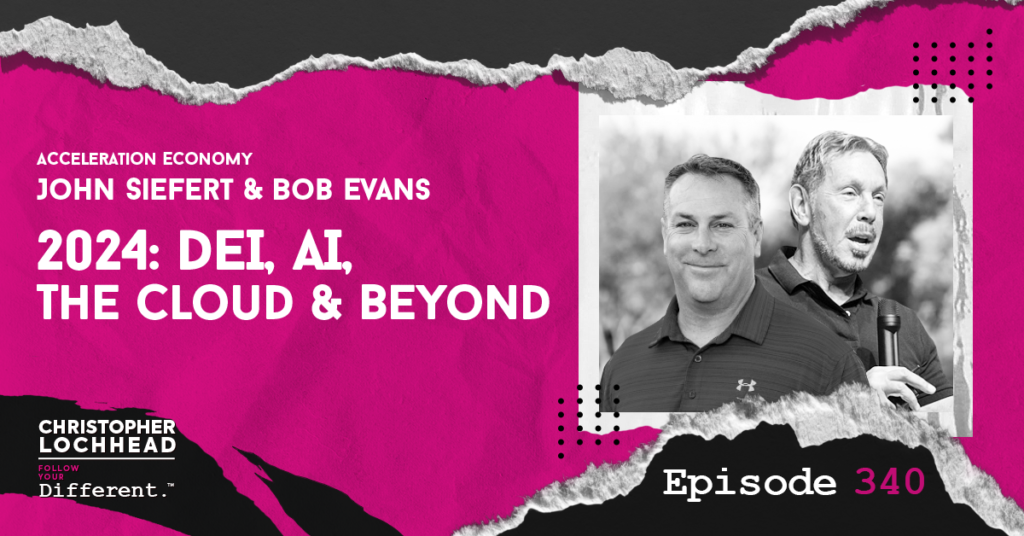
Podcast: Play in new window | Download (Duration: 1:11:56 — 49.4MB) | Embed
Subscribe: Apple Podcasts | Spotify | Pandora | RSS | More
Today on Christopher Lochhead: Follow Your Different, John Siefert and Bob Evans, the leaders and founders of Acceleration Economy, join in on the dialogue about DEI, AI, and what’s in store for 2024.
In addition, Bob Evans is also the host of the podcast called Cloud Wars Live, which Christopher has actually been a guest to a few times. They also have some great guests and amazing discussions over there, so go check them out after this episode.
That said, let’s dive in into this dialogue and prepare ourselves for the upcoming year.
You’re listening to Christopher Lochhead: Follow Your Different. We are the real dialogue podcast for people with a different mind. So get your mind in a different place, and hey ho, let’s go.
John Siefert on DEI in Tech Industry
The discussion opens up on the topic of what they have learned in the past year. One thing they agreed on immediately is that people seem to have gotten a little dumber in 2023. Not like major blunders and the like, but more like small things that might seem inconsequential at first, and came back to bite them before the year’s end.
After this brief exchange, the topic shifts to the topic of morals and intellectual decay that they have observed in the tech industry, particularly in the implementation of DEI statutes and the like. John Siefert comments on DEI, more specifically how a well-intentioned thing on paper could become twisted and be exploited when applied in the current social landscape.
An example in the discussion is that people are being told to hire a diverse staff not because of being inclusive, but rather to meet certain numbers and get benefits out of it. Given these circumstances seemingly are the norm nowadays, Christopher believes that the floodgates might open once this one particular case sets precedence.
Bob Evans on how DEI is distorted in practice
Bob adds to the topic of DEI and points out that the distortion often comes on how it was implemented, e.g. if it’s already done in bad faith from people up in management for a few people’s benefit, then the struggle to actually implement a proper setup will be that much harder.
It has come to the point that Inclusion is being used to actually exclude people. The example that the group gives is that certain analysts believe that Asians are overrepresented in Tech. So rather than hiring someone that is very capable in the required position, companies end up not opting to hire such talent because the person is Asian, and therefore skew their DEI scores. They would end up hiring for diversity rather than skill, and this dilutes their products and services, causing overall loss in the long run.
The point of DEI was to be fair and impartial, and yet in practice it just became a way to fulfill certain requirements for special perks, sometimes to the detriment of the company.
To hear more about Bob Evans’ and John Siefert’s thoughts on DEI, AI, and what 2024 has in store for us, download and listen to the episode.
Bio
John Siefert
Chief Executive Officer, Acceleration Economy Co-founder
John is a strategic thinker and business builder who loves to reimagine what is possible with smart people who are not afraid of the future. He has the ability to visualize voids in the market and then define a people, product, process, and position approach to creating a brand where that void once existed.
Bob Evans
Cloud Wars Founder, Acceleration Economy Co-founder, Analyst
Bob analyzes business innovation, cloud technology, leadership, corporate strategy, and the global digital economy. He’s the founder of Cloud Wars, was recruited by and worked for Larry Ellison, and shares his thinking via daily videos, daily articles, newsletters, and podcasts.
Links
Connect with John Siefert and Bob Evans!
Acceleration Economy Network | Cloud Wars Live: Apple Podcast & Spotify
Bob’s LinkedIn | John’s LinkedIn
We hope you enjoyed this episode of Christopher Lochhead: Follow Your Different™! Christopher loves hearing from his listeners. Feel free to email him, connect on Facebook, Twitter, Instagram, and subscribe on iTunes!
339 A Wish for Different in 2024
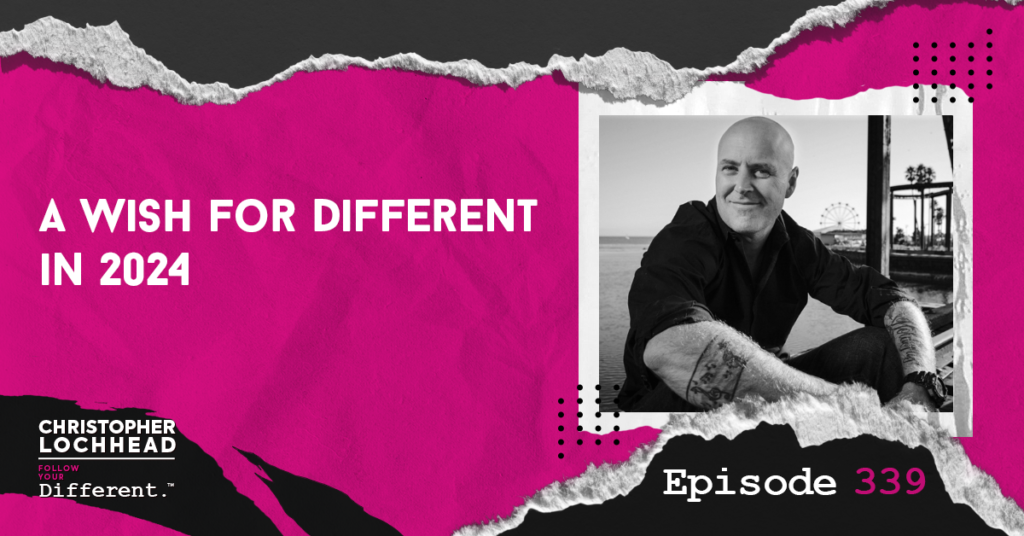
Podcast: Play in new window | Download (Duration: 45:45 — 31.4MB) | Embed
Subscribe: Apple Podcasts | Spotify | Pandora | RSS | More
First and foremost, we at Christopher Lochhead: Follow Your Different would like to wish everyone from the bottom of our hearts, happy holidays. We hope that you have an opportunity to be with the people you love this time of year, and enjoy some happiness and peace.
That said, there seems to be a lot going on lately. Be it about antisemitism, diversity, equality, and inclusion, and sort of the core values that the United States will be governed by and will latch on to. So I wanted to take this time and have a talk between you and I.
You may not like what I will have to say, and that is all right. The important thing is that we have a good dialogue between us, and open ourselves to thinking Different does not always mean they hate you and your type of thinking.
As we head to 2024, that is my wish for the holiday season. That we have a breakthrough in real, authentic, civilized, thoughtful dialogue.
You’re listening to Christopher Lochhead: Follow Your Different. We are the real dialogue podcast for people with a different mind. So get your mind in a different place, and hey ho, let’s go.
Christopher Lochhead on LGBTQ+ rights over the years
Christopher shared a heartwarming story about a LinkedIn acquaintance, a marketing executive, who recently had a baby with her wife. They had a positive exchange about babies, and Christopher expressed genuine happiness for the couple.
“Around here, we think babies are fucking fantastic, especially when they’re born to good people who are committed to raising those children and loving knows children. What could be better than a great couple are a great group of folks who have a baby, love that baby, and do everything in their power to provide that child with a great life and enjoy that child. It’s wonderful.”
– Christopher Lochhead
Christopher then reflected on growing up around queer individuals, recalling the challenges they faced over the years. He emphasized the progress in societal acceptance of the queer community, highlighting the positive change that allows people to openly share personal milestones without fear of judgment.
That said, Christopher expressed joy for the LinkedIn acquaintance, appreciating that she can legally be herself and share her family news without hesitation, considering it a legendary step forward, especially in the United States.
Christopher Lochhead on mortgage discrimination
Christopher then talks about a CNN headline that revealed the systemic racism about the Navy Federal Credit Union’s discriminatory mortgage approval practices.
The report states that while over 75% of white applicants were approved for conventional home purchase mortgages, less than 50% of black applicants were approved under the same circumstances. Christopher condemns this as not just systemic racism but outright evil. He criticizes financial institutions like Wells Fargo for repeatedly facing charges related to racial discrimination without executives facing jail time. He emphasizes the urgent need to acknowledge and fight systemic racism for true equality and justice, citing the 14th Amendment of the US Constitution.
“This is racism right in front of us. And anybody who’s just anybody who cares about equality, and justice, and the pursuit of happiness for all must acknowledge that there is systemic racism against certain groups. There’s no doubt about that. And we need to fight it. We really need to fight it.”
– Christopher Lochhead
On Systemic Racism and DEI in society
Christopher expresses concern about the rise of hatred, particularly in the context of recent events, notably the conflict in the Middle East. He highlights the misunderstandings surrounding the October 7th events, emphasizing the severity of the situation and the explicit threat against Israel and the Jewish population.
Christopher is dismayed by the confusion and the lack of recognition for Israel’s right to defend itself. He shares a personal experience of a friend falling victim to violence and underscores the complexity of the situation, acknowledging the tragedy on both sides.
Christopher attributes the rise in hatred to the teachings of diversity, equity, and inclusion (DEI), which he suggests simplifies the world into oppressors and oppressed, fostering division and victimhood competitions rather than promoting genuine understanding and collaboration.
To hear more of Christopher Lochhead’s thoughts on 2023 and his wish for the coming year, download and listen to this episode.
Bio
Links
We hope you enjoyed this episode of Christopher Lochhead: Follow Your Different™! Christopher loves hearing from his listeners. Feel free to email him, connect on Facebook, Twitter, Instagram, and subscribe on iTunes
188 A Wish for Different in 2024
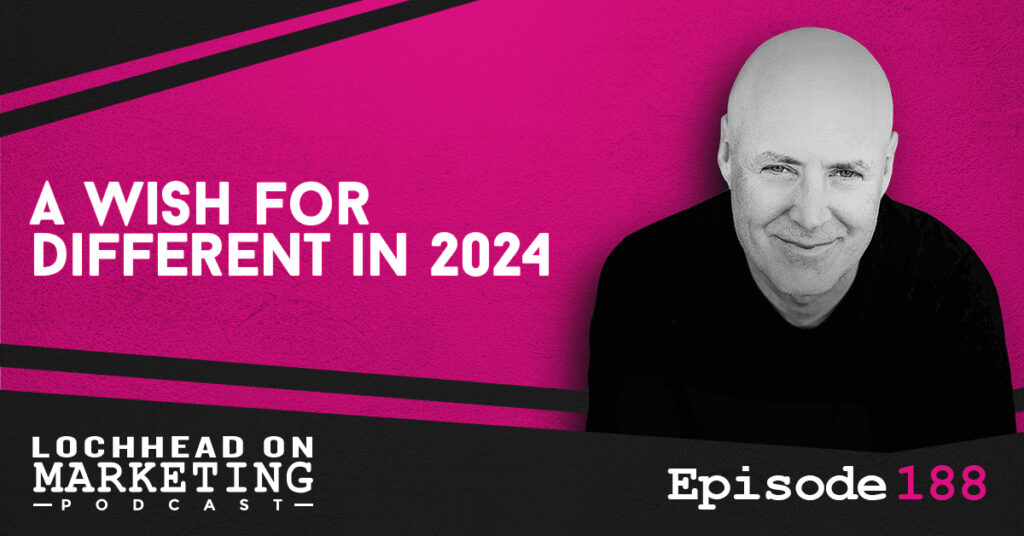
Podcast (lochheadonmarketing): Play in new window | Download (Duration: 45:45 — 31.4MB) | Embed
Subscribe: Apple Podcasts | Spotify | RSS | More
First and foremost, we at Lochhead on Marketing would like to wish everyone from the bottom of our hearts, happy holidays. Christopher Lochhead hopes that you have an opportunity to be with the people you love this time of year, and enjoy some happiness and peace.
That said, there seems to be a lot going on lately. Be it about antisemitism, diversity, equality, and inclusion, and sort of the core values that the United States will be governed by and will latch on to. So I wanted to take this time and have a talk between you and I.
You may not like what I will have to say, and that is all right. The important thing is that we have a good dialogue between us, and open ourselves to thinking Different does not always mean they hate you and your type of thinking.
As we head to 2024, that is my wish for the holiday season. That we have a breakthrough in real, authentic, civilized, thoughtful dialogue.
Welcome to Lochhead on Marketing. The number one charting marketing podcast for marketers, category designers, and entrepreneurs with a different mind.
Christopher Lochhead on LGBTQ+ rights over the years
Christopher shared a heartwarming story about a LinkedIn acquaintance, a marketing executive, who recently had a baby with her wife. They had a positive exchange about babies, and Christopher expressed genuine happiness for the couple.
“Around here, we think babies are fucking fantastic, especially when they’re born to good people who are committed to raising those children and loving knows children. What could be better than a great couple are a great group of folks who have a baby, love that baby, and do everything in their power to provide that child with a great life and enjoy that child. It’s wonderful.”
– Christopher Lochhead
Christopher then reflected on growing up around queer individuals, recalling the challenges they faced over the years. He emphasized the progress in societal acceptance of the queer community, highlighting the positive change that allows people to openly share personal milestones without fear of judgment.
That said, Christopher expressed joy for the LinkedIn acquaintance, appreciating that she can legally be herself and share her family news without hesitation, considering it a legendary step forward, especially in the United States.
Christopher Lochhead on mortgage discrimination
Christopher then talks about a CNN headline that revealed the systemic racism about the Navy Federal Credit Union’s discriminatory mortgage approval practices.
The report states that while over 75% of white applicants were approved for conventional home purchase mortgages, less than 50% of black applicants were approved under the same circumstances. Christopher condemns this as not just systemic racism but outright evil. He criticizes financial institutions like Wells Fargo for repeatedly facing charges related to racial discrimination without executives facing jail time. He emphasizes the urgent need to acknowledge and fight systemic racism for true equality and justice, citing the 14th Amendment of the US Constitution.
“This is racism right in front of us. And anybody who’s just anybody who cares about equality, and justice, and the pursuit of happiness for all must acknowledge that there is systemic racism against certain groups. There’s no doubt about that. And we need to fight it. We really need to fight it.”
– Christopher Lochhead
On Systemic Racism and DEI in society
Christopher expresses concern about the rise of hatred, particularly in the context of recent events, notably the conflict in the Middle East. He highlights the misunderstandings surrounding the October 7th events, emphasizing the severity of the situation and the explicit threat against Israel and the Jewish population.
Christopher is dismayed by the confusion and the lack of recognition for Israel’s right to defend itself. He shares a personal experience of a friend falling victim to violence and underscores the complexity of the situation, acknowledging the tragedy on both sides.
Christopher attributes the rise in hatred to the teachings of diversity, equity, and inclusion (DEI), which he suggests simplifies the world into oppressors and oppressed, fostering division and victimhood competitions rather than promoting genuine understanding and collaboration.
To hear more of Christopher Lochhead’s thoughts on 2023 and his wish for the coming year, download and listen to this episode.
Bio
Links
We hope you enjoyed this episode of Lochhead on Marketing™! Christopher loves hearing from his listeners. Feel free to email him, connect on Facebook, Twitter, Instagram, and subscribe on iTunes!
338 Ancient Wisdom to Mend Our Broken Hearts and World with Rabbi Sharon Brous, Bestselling Author of “The Amen Effect”
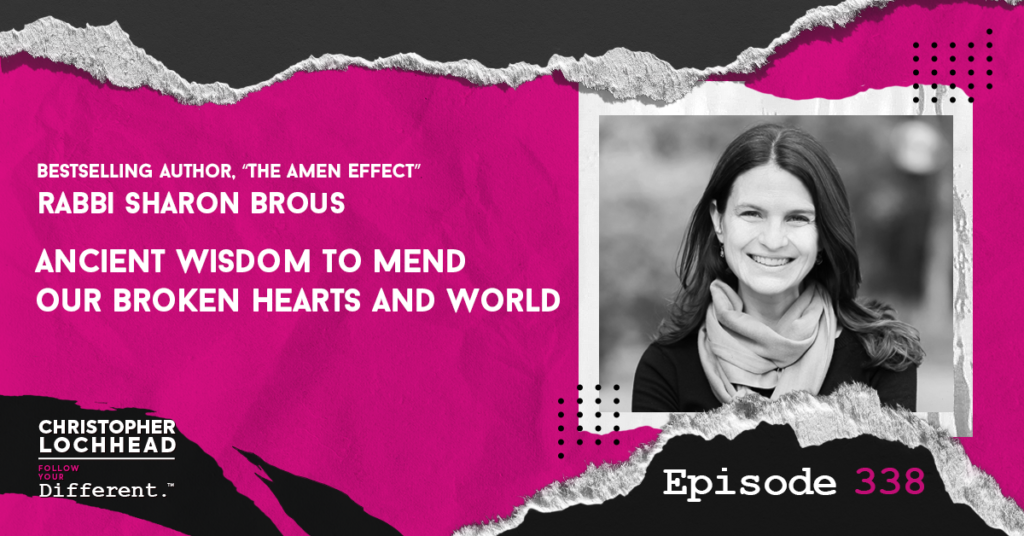
Podcast: Play in new window | Download (Duration: 1:17:46 — 53.4MB) | Embed
Subscribe: Apple Podcasts | Spotify | Pandora | RSS | More
Every thinking person and caring person has been affected by the pain and suffering in our world of late. And most of us have been grappling with the horrors of October 7 and everything that has come since then. Today, Rabbi Sharon Brous is here to help us make sense of it all.
Rabbi Sharon Brous is the founding rabbi of IKAR Jewish synagogue and community in LA. Rabbi Sharon was also chosen to bless President Obama and Vice President Biden at their inaugural in 2013, and she returned to do the same for President Biden and vice president Harris in 2021. She was also named the number one most influential rabbi in the United States by Newsweek and The Daily Beast.
Her new book is available now for preorder and it also makes a wonderful gift for yourself and for others. It’s called The Amen Effect, ancient wisdom to mend our broken hearts and world, and I think you’ll love it. So pick up a copy today wherever you get legendary books.
You’re listening to Christopher Lochhead: Follow Your Different. We are the real dialogue podcast for people with a different mind. So get your mind in a different place, and hey ho, let’s go.
Rabbi Sharon Brous on coping with grief
The conversation begins with Christopher asking Rabbi Sharon Brous about coping with grief and finding hope post-tragedy. Rabbi Sharon admits feeling shattered, expressing concern for her family and the world. Despite the prevailing sorrow, she emphasizes the pivotal moment in history, urging a deliberate choice toward healing.
Christopher questions how, as a rabbi, she addresses anger, fear, and despair. Rabbi Sharon sees her role as a pastor: comforting the afflicted, acknowledging pain, and fostering empathy. She encourages reconnecting with shared humanity, emphasizing agency in shaping a better future.
“I think that my first job is to be a pastor, to really be a pastor to my community. To, as we say, comfort the afflicted, to name out loud the pain that people are experiencing, to affirm how incredibly worrisome and anguished this time really is. And not to stop there – to then lead us to stretch our hearts and try to find some empathy from our own suffering, to try to reestablish links to a world that we dream is possible, even from out of the depth of the world that we find ourselves in.”
– Rabbi Sharon Brous
Rabbi Sharon Brous on loneliness and finding a community after a tragedy
Christopher shares his distress post-October 7, expressing shock and concern at the rising anti-Semitic behavior. He opens up about feeling out of control, lonely, and abandoned—a sentiment echoed by others.
Rabbi Sharon Brous acknowledges the surprising existential loneliness post-tragedy. Drawing on Dr. Vivek Murthy’s insights, she links loneliness to a gap between needed and actual social connections. Rabbi Sharon underscores the importance of reaching out, emphasizing that human thriving relies on connections. She encourages overcoming the inclination to retreat, advocating for rebuilding bridges to the mainland, as no one can self-sustain on an island.
Reflecting on her own experience after October 7, Rabbi Sharon highlights the healing power of shared humanity, even across cultural divides.
Rabbi Sharon Brous on healing and reconciliation in the Israeli-Palestinian conflict
On the topic of stopping the Israeli-Palestinian conflict, Rabbi Sharon Brous envisions a future of reconciliation and healing. She rejects the idea of a military solution and emphasizes the necessity of building a shared future as neighbors.
“I believe, along with the many thousands of Israeli Jews and Palestinian citizens of Israel, who are part of a very vibrant civil society in Israel, that the only way forward will be together. I believe that ultimately, there will not be a military solution to this conflict, that ultimately, we are going to have to find a way to build a future as neighbors.”
– Rabbi Sharon Brous
Despite the current pain and challenges, she draws inspiration from civil society leaders in Israel, such as the bereaved families’ forum and Combatants for Peace, who have been working together for decades. Brous believes that fostering curiosity and humanity will be crucial in navigating the path towards coexistence.
She introduces the concept of “The Amen Effect” from her upcoming book, emphasizing ancient wisdom to mend both broken hearts and a fractured world.
Bio
Rabbi Sharon Brous is the senior and founding rabbi of IKAR, a leading-edge Jewish community based in Los Angeles.
Rabbi Sharon Brous is a leading voice in reanimating religious life in America, working to develop a spiritual roadmap for a soulful, justice-driven, multi-faith ethos in Los Angeles and around the country.
Brous is the senior and founding rabbi of IKAR, a Jewish community that launched in 2004 to reinvigorate Jewish practice and inspire people of faith to reclaim a moral and prophetic voice. IKAR quickly became one of the fastest growing and most influential Jewish congregations in the country, and is credited with sparking a rethinking of religious life in a time of unprecedented disaffection and declining affiliation.
Brous’s 2016 TED talk, “Reclaiming Religion,” has been viewed by more than 1.4 million people and translated into 23 languages.
In 2013, she blessed President Obama and Vice President Biden at the Inaugural National Prayer Service, and returned in 2021 to bless President Biden and Vice President Harris, and then to lead the White House Passover Seder that spring.
Brous spoke at the Women’s March in Washington, DC in 2017 and at the opening of the National Memorial for Peace and Justice the following year.
She was named #1 on the Newsweek/The Daily Beast list of the most influential Rabbis in America, and has been recognized by The Forward and the Jerusalem Post as one of the fifty most influential Jews.
In 2021 she was one of CAP’s 21 Faith Leaders to Watch, and she was featured on the cover of TIME magazine in a 2018 tribute to Norman Rockwell’s Four Freedoms.
Brous is in the inaugural cohort of Auburn Seminary‘s Senior Fellows program, which unites top faith leaders working on the frontlines for justice. She also sits on the faculty of the Shalom Hartman Institute-North America and REBOOT, and serves on the International Council of the New Israel Fund, the national steering committee for the Poor People’s Campaign, and the advisory board of Dayenu, a Jewish Call to Climate Justice.
She is a graduate of Columbia University, was ordained by the Jewish Theological Seminary, and lives in Los Angeles with her husband and three children.
Her first book, THE AMEN EFFECT, is available for pre-order now.
Links
Connect with Rabbi Sharon Brous!
Grab her new book, The Amen Effect here:
Penguin Random House
Amazon Books
We hope you enjoyed this episode of Christopher Lochhead: Follow Your Different™! Christopher loves hearing from his listeners. Feel free to email him, connect on Facebook, Twitter, Instagram, and subscribe on iTunes
337 Inside the Mind of “CEO Whisperer” Jerry Colonna, Bestselling Author of “Reunion – Leadership and the Longing to Belong”
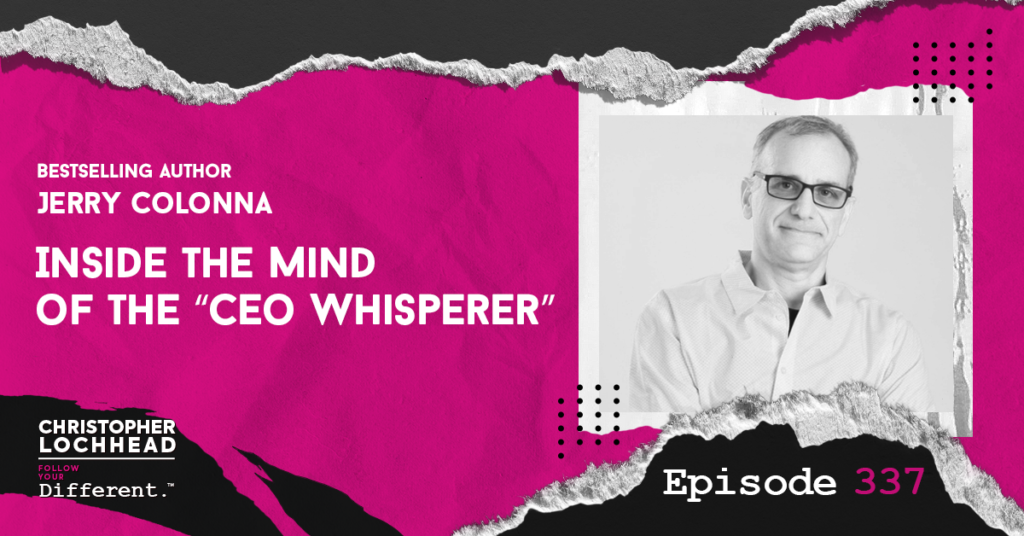
Podcast: Play in new window | Download (Duration: 1:30:30 — 62.1MB) | Embed
Subscribe: Apple Podcasts | Spotify | Pandora | RSS | More
On this episode of Christopher Lochhead: Follow Your Different, we have the great pleasure of talking to the “CEO whisperer” Jerry Colonna, once again.
Jerry Colonna is back, and he has a new book to share with everyone. It’s called Reunion – Leadership and the longing to Belong. If you think radical, intimate conversations about careers are a powerful and important thing, you’re gonna love everything about this conversation with Jerry.
You’re listening to Christopher Lochhead: Follow Your Different. We are the real dialogue podcast for people with a different mind. So get your mind in a different place, and hey ho, let’s go.
Jerry Colonna on Fame and being the same person all the time
The conversation starts off with Christopher Lochhead and Jerry Colonna discussing the impact of their voices in podcasting, highlighting how listeners feel connected as they follow along Christopher and Jerry’s dialogues, as if they’re actually part of the conversation. They also think that being authentic online and offline is always a good thing, sharing their personal anecdotes and experiences.
Christopher mentions meeting famous people and how Bill Walton handles fame graciously. On the flip side, Jerry reflects on the unnerving aspect of being known by strangers due to his work.
They both emphasize the challenge of balancing public perception and personal identity, especially in the digital age. But at the same time, they appreciate the connection with their audience but acknowledge the unique dynamics of being recognized.
Jerry Colonna on having Empathy and Compassion in Leadership
Jerry discusses the importance of empathy and compassion, highlighting that being fully present and authentic allows for genuine connections. He attributes the current low levels of empathy in leadership roles to various forces and suggests that those in power may benefit from maintaining the status quo.
Jerry Colonna, known as a prominent CEO coach, defends the relevance of discussing human aspects in business conversations. He believes that better humans make better leaders and expresses a responsibility for leaders to contribute to making the world a better place. Though he is also concerned about the divisive state of society and urges business leaders to engage in dialogue to address the issues tearing communities apart.
Jerry Colanna on Suffering and how to cope & make a difference
Christopher and Jerry then explore the challenges of coping with widespread suffering and violence.
Jerrry draws insights from Buddhist teachings, emphasizing the need for empathy and compassion. He discusses the choices people face in response to suffering and highlights the Buddhist perspective on addressing and transcending it. Jerry also introduces the concept of the tragic gap, urging individuals to stand between the present reality and a better future.
Christopher shares his view of embracing change as the only sensible choice, rejecting defeatism. The conversation concludes with a quote from Captain Paul Watson, emphasizing the importance of focusing on the present to shape a better future.
To hear more from Jerry Colonna, his thoughts on his new book, and leadership in general, download and listen to this episode. You can also check out his previous episode here at FYD episode 067.
Bio
Jerry Colonna is an executive coach who uses the skills he learned as a venture capitalist to help entrepreneurs.
He draws on his wide variety of experiences to help clients design a more conscious life and make needed changes to their career to improve their performance and satisfaction.
Previously he was a partner with JPMorgan Partners (JPMP), the private equity arm of JP Morgan Chase.
He joined JPMP from Flatiron Partners, which he launched 1996 with partner, Fred Wilson. Flatiron became one of the most successful, early-stage investment programs in the New York City area.
Links
Connect with Jerry Colonna!
About Jerry | Reunion / Get the eBook! | Reboot Leadership | Twitter/X | LinkedIn
Wired: This man makes Founders cry
We hope you enjoyed this episode of Christopher Lochhead: Follow Your Different™! Christopher loves hearing from his listeners. Feel free to email him, connect on Facebook, Twitter, Instagram, and subscribe on iTunes
336 How Startup Founders Build A Legendary Life with Brad Pedersen, Co-founder & Chairman of Lomi
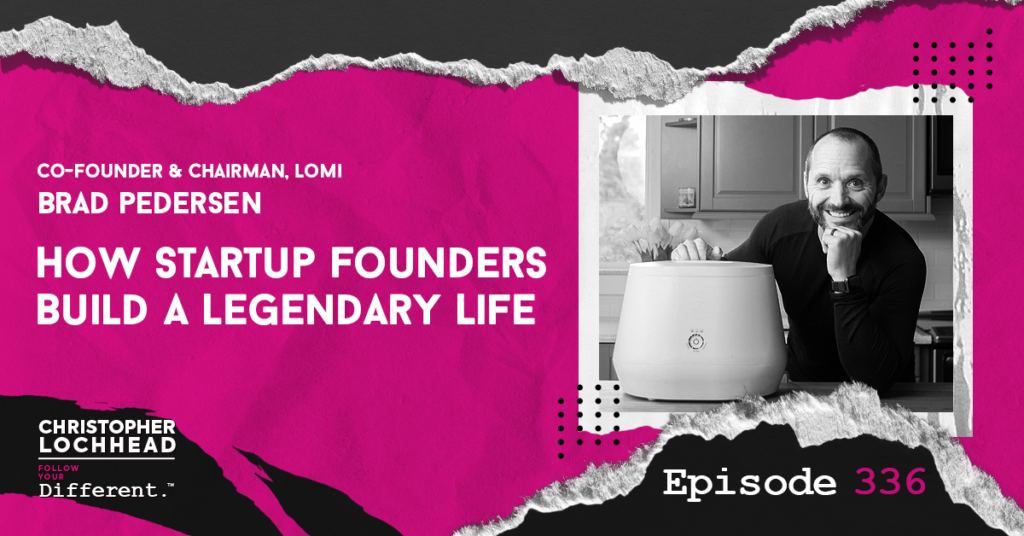
Podcast: Play in new window | Download (Duration: 1:04:49 — 44.5MB) | Embed
Subscribe: Apple Podcasts | Spotify | Pandora | RSS | More
Every entrepreneur and every person who’s creative wants to have a deeply fulfilling professional and personal life. But it can be easy to get distracted and pulled off course, which is why we all need “Touchstone Moments” to remind us of what matters. Today, we talk about it with our guest, Brad Pedersen.
Brad Pedersen is a lifelong entrepreneur, and the Co-founder & Chairman at Lomi. He’s got a new bestseller out called Startup Santa, a toy makers tale of 10 business lessons learned from timeless toys, and it’s great.
What you’re about to experience is a deeply personal conversation about life and startups, the toy business and Brad’s learnings from creating Lomi, which is pioneering the smart home composter category. If you think real, meaningful conversations about life and business matter, you’re in the right place.
You’re listening to Christopher Lochhead: Follow Your Different. We are the real dialogue podcast for people with a different mind. So get your mind in a different place, and hey ho, let’s go.
Brad Pedersen on courage and creativity in entrepreneurship
Christopher Lochhead and Brad Pedersen start off the conversation with the importance of courage and creativity in entrepreneurship.
Christopher reflects on his initial doubts before launching his book, Play Bigger, emphasizing the unpredictability of how the world will respond. Brad praises his courage to put his ideas out there, highlighting the power of the Internet in connecting people.
Brad defines courage as finding the balance between recklessness and carelessness, emphasizing its pivotal role in decision-making. He values the courage to embrace the unknown, pursue ideas despite criticism, and create value in the world. Their exchange showcases the transformative impact of courage and the Internet in scaling ideas and fostering meaningful connections.
On Mentoring and throwing a rope to those who need it
The conversation then shifts into the importance of experienced entrepreneurs helping newcomers.
Christopher emphasizes the value of giving back and supporting others in their entrepreneurial journey, drawing from his own mentors like David Ogilvy. They discuss the accessibility of mentors in the digital age, debunking the misconception that mentors are unapproachable.
Brad shares his perspective on mentorship, emphasizing the significance of personal growth and the importance of mentors who focus on becoming better individuals. They challenge the pursuit of materialistic achievements, advocating for meaningful connections and personal development. Brad also suggests evaluating mentors based on their character and the positive impact they’ve made, highlighting the enduring value of genuine connections and intrinsic fulfillment.
Brad Pedersen on prioritizing growth over material gains
Continuing on the topic of mentorship, they discuss the evolving nature of mentorship and personal growth in the digital age. Christopher reflects on the accessibility of mentors in the digital world, contrasting it with the past when connecting with influential figures was challenging. He criticizes the influence of “hustle porn stars” who promote materialism and envy. Lochhead emphasizes the genuine connection and humility he values in mentors.
Brad agrees with the assessment, focusing on personal growth and the pursuit of intrinsic value over material possessions. He highlights the importance of mentors who exhibit excellence and virtue.
Christopher then shares a humorous anecdote about a wealthy individual’s arrogance, emphasizing the significance of genuine connections over material displays.
To hear more from Brad Pedersen and how to realize your touchstone moments in your life, download and listen to this episode.
Bio
Brad Pedersen: Co-founder and Chairman of Lomi.
Brad Pedersen is an award-winning entrepreneur, angel investor, thought leader, and sought-after business coach.
In 2008, he founded and scaled one of Canada’s top toy companies, merged it to co-found Basic Fun and subsequently co-founded Pela, the 100 million sustainable phone case startup that created an entirely new category.
In 2021, Brad and the team at Pela successfully launched a record-breaking 9.8 million crowd-sourced campaign for the Lomi, the world’s first smart waste kitchen composter.
Brad has a passion for faith, fitness, adventure, and outdoor pursuits and lives in the mountains of British Columbia with his amazing wife, where they are building a beautiful life!
Links
Connect with Brad Pedersen!
Brad’s Website | Lomi | Brad’s new book: Startup Santa
We hope you enjoyed this episode of Christopher Lochhead: Follow Your Different™! Christopher loves hearing from his listeners. Feel free to email him, connect on Facebook, Twitter, Instagram, and subscribe on iTunes
335 Inside Israel with Dr. Giora Yaron, former Chairman of Tel Aviv University
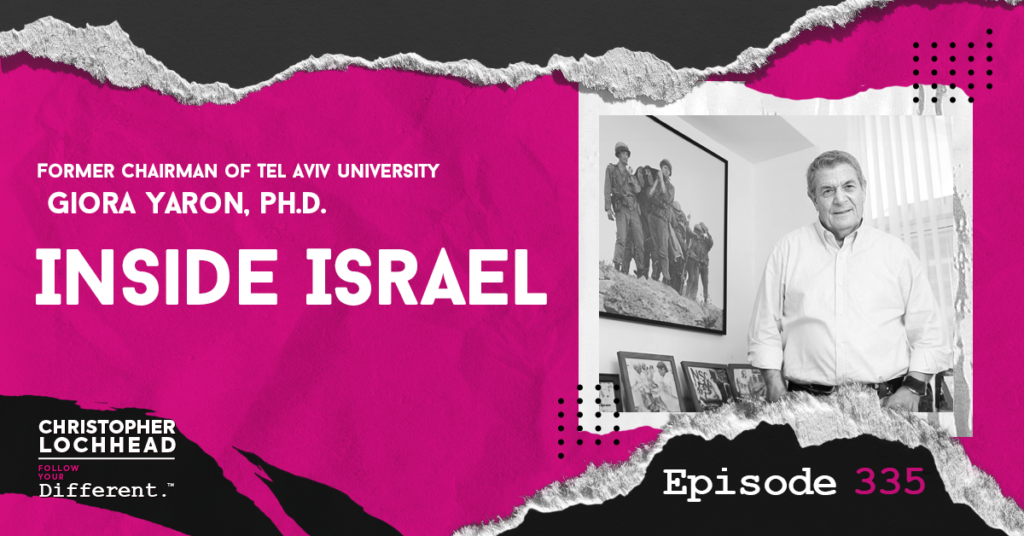
Podcast: Play in new window | Download (Duration: 1:12:12 — 49.6MB) | Embed
Subscribe: Apple Podcasts | Spotify | Pandora | RSS | More
Today on Christopher Lochhead: Follow Your Different, we have a special episode featuring a good friend of mine, Dr. Giora Yaron. We talk about what’s happening in Israel now, the realities of the situation Israel faces and what’s likely to happen next.
Dr. Giora Yaron is considered a legend in the startup tech world. He’s known as one of the key players in creating the tech startup VC ecosystem. He started his career as a Senior Executive in National Semiconductor in the United States. And subsequent to that he’s founded, co-founded, and/or been the chairman of more than 25 Deep-tech startups. He’s also the former chairman of Tel Aviv University.
Dr. Yaron is also a decorated Israeli Defense Forces Combat officer. And today, he serves as a strategic adviser to the Israeli Ministry of Defense.
No matter what you think about this war, no matter how much you think you might know, there’s a lot to learn in this riveting captivating, in depth, no BS conversation with a living Israeli legend. Also, it’s important to note this episode was recorded on October 26 2023.
You’re listening to Christopher Lochhead: Follow Your Different. We are the real dialogue podcast for people with a different mind. So get your mind in a different place, and hey ho, let’s go.
Dr. Giora Yaron on the current situation in Israel
Christopher Lochhead and Dr. Giora Yaron discuss the situation in Israel. Dr. Yaron shares how his family was safe living far from conflict zones, although they hosted affected families initially.
He mentioned the challenges faced by IDF with a significant number drafted and the delicate balance in completing the mission while saving hostages.
Dr. Yaron also highlighted past incidents, comparing the current situation to previous attacks in 1973 and 2002. He expressed concerns about dealing with barbarian savages and the challenge of maintaining Israeli values while addressing the crisis.
Dr. Giora Yaron on the conflict’s impact on civilians
The conversation then shifts to the topic of the recent conflict in Israel and its impact on civilians.
Dr. Yaron discusses the strategic and moral dilemmas faced by Israel in dealing with groups like Hamas and the challenges in differentiating between combatants and civilians. He emphasizes the need to combat extremist groups aiming to establish an Islamic state and the importance of military action to achieve this.
Christopher notes that many veterans, like Colin Powell, become peacemakers later in life and discussed the heroic efforts of civilians in the conflict. But Dr. Yaron responds that the situation isn’t about pursuing peace but dealing with an ongoing conflict.
Dr. Giora Yaron on Cultural Differences and how it affects perception in the West
Dr. Yaron shares his concerns about the disconnect between Western sympathies for Palestinians and the harsh realities faced by Israelis due to terrorist attacks.
He emphasizes the need for a practical approach and shared personal experiences, such as Mellanox’s tragic incident, to illustrate the challenges faced in pursuing peace in the region. He further underscores the complexities of the situation and the clash between idealistic hopes for peace and the harsh realities on the ground.
To hear more from Dr. Giora Yaron and the clash of ideals in Israel, download and listen to this episode.
Bio
Dr. Giora Yaron is the former Chairman of Tel Aviv University (Executive Council), and on the board of Amdocs (DOX).
Dr. Yaron serves on the advisory board of the Israeli Ministry of Defense.
He is also an active Founding Investor and Founder of a group of high-tech and med-tech companies; P-cube, (acquired by Cisco), PentaCom (acquired by Cisco), Qumranet (acquired by Redhat), Comsys (acquired by Conexant, Texas Instruments), Exanet (acquired by Dell) Hyperwise Security (acquired by Checkpoint) Qwilt, Itamar Medical, Excelero, Equalum and, Aqua Security.
Dr. Yaron has been serving as board member and/or Chairman of the Boards of these companies since their inception.
Dr. Yaron served as Chairman of the Board of Mercury Interactive (acquired by HP for $4.5B US).
From 1992-1995 Dr. Yaron has served as President of Indigo NV, leading the company to an NASDAQ IPO. Prior to joining Indigo served as corporate Vice President of National Semiconductor and was the Founder of National wafer fab in Israel (today Tower-Jazz Semiconductors) [https://issuu.com/malgin/docs/national_semiconductor_israel].
In 2008 Dr Yaron presented at the Computer History Museum the revolutionary microprocessor development work he lead with his team at NCS which provides the foundation for the microprocessors as we know them today.
Dr Yaron was granted Honorary Fellowships by The Hebrew University In 2009 .
In the years 2009-2013 served on Israel Prime Minister Entrepreneurship and Innovation Committee
Dr. Yaron holds a Ph.D. in Device Physics from the Hebrew University has published numerous scientific papers and holds numerous patents.
Links
Connect with Dr. Giora Yaron!
We hope you enjoyed this episode of Christopher Lochhead: Follow Your Different™! Christopher loves hearing from his listeners. Feel free to email him, connect on Facebook, Twitter, Instagram, and subscribe on iTunes

